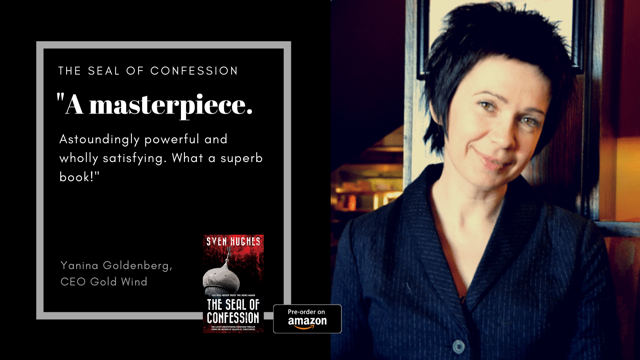
Author Interview: Sven Hughes
Sven Hughes has worked at the heart of geostrategic influence for the past twenty years. As a prime ministerial and presidential advisor, and as a global expert in counter violent extremism techniques. As a reserve soldier, Sven served in Military Intelligence, Psychological Operations and Special Forces. As an author, he has written ‘Verbalisation’ which was accepted into the State Department library, as well as ‘Selling St. Christopher’, his first novel. As a screenwriter, he has written ‘Ghost Machine’ (2009) and ‘Telephone Detectives’ (2003). As a journalist, he has written for The Telegraph, The Spectator, City AM and Metro. He has appeared on BBC News, Sky News, SpyCast, Jazz FM and Talk Radio. As an expert commentator, he has appeared in ‘Big Boys Gone Bananas’ (2011) and ‘People You May Know’ (2020).

Hello Mr. Hughes and thank you for agreeing to this interview. Would you like to tell us some things about yourself?
I am a fulltime Communications Strategist and a part-time novelist.
Communications Strategist sounds like an exciting field. I must say “The Seal of Confession” is an amazing book. Have you published more?
Thank you. The Seal of Confession is the second book in a series of three. Although, I hope it stands up as a satisfying novel in its own right.
Espionage thrillers are one of my favorite book genres. What drew you into writing espionage thrillers?
My father. He was a huge fan of Fleming and Le Carré, and I inherited both his books and his love of the genre.

Did you find it difficult writing “The Seal of Confession”?
No. At least, not beyond the late nights and copious coffees that are required in the writing of any novel.
You’ve created an audiobook of “The Seal of Confession” which was beautiful. Could you share your experience with making an audiobook?
As always, it’s about enlisting the support of the best people. Justin Hill (‘The Other Operation’) handled the recording and directing. Lucy Scott (‘Pride and Prejudice’) did the read. From the moment Justin recommended Lucy, I knew we had the right actor. Her subtlety, but also her steeliness, are ideal for the text. I’m genuinely delighted with her performance. I’m glad to hear that you also enjoyed it.
What is the easiest and the most difficult part of the publishing process, in your experience?
Well, as my novels are essentially self-published, the process has been relatively simple. I have an agent, but no big-brand publishing house behind me. That makes things difficult in the sense that I don’t have their money and marketing on my side, but also easier, because I don’t have to deal with all the delays and groupthink associated with many of those companies.
Would you like to tell us one book that affected your life and writing career?
The works of Vladimir Sorokin. He’s a contemporary postmodern Russian writer, who manages to juxtapose moments of effortless lyricism, with searing political satire. His short novel, ‘Day of the Oprichnik’ is a writing masterclass. I have no doubt that it has fundamentally influenced my own style, as well my confidence to write books that deal with social issues that aren’t usually encompassed by mainstream fiction.

How did you feel when you read your first five-star review? The first of many?
I’m certainly pleased to see that my novels have been reasonably well-received to date. However, it’s so easy to post ratings on the review sites, that I take ‘stars’ with a pinch of salt. I find it much more interesting to read what people have actually said about the books. When someone takes the time to write a proper, considered, review then I’ll certainly try and take the time to read it carefully. Realtime feedback can be extremely useful to understand what hasn’t worked, as much as what has.
Do you make a plan of the plot and the characters before you start writing?
I sketch out the story on one page of A4. Literally, a diagram with arrows pointing this way and that. After that, I start with the first sentence and see where the characters want to go. I never know the ending until it writes itself.

When you entered the world of publishing, where there any myths that you later realized were false?
The best piece of advice I received was from a former agent. He used to say, “no one knows anything” in relation to the world of publishing and screenwriting. I think he was quoting William Goldman. I’ve always tried to remember that. However well-groomed and confident the person sitting across the table from you, there’s a good chance they’re bullshitting.
What was the most bizarre question someone asked you about your book or your writing career?
“You must be rich now with all those book sales?” They clearly didn’t understand the reality of being an author.
What is your schedule like when you’re writing?
I’ll work eighteen to twenty hours a day for three weeks to get the first draft down. After that, the editing and redrafting takes a couple of additional months, with a less intense schedule.
Do you have any hobbies?
I only write what I know, so any hobbies I have appear within the books. The main characters have adopted my various interests.

What is your advice to aspiring authors?
Do it yourself. Don’t wait for permission or praise, just get on with it and do it yourself.
What are your plans for the future?
I’ll be writing the third and final book in this series at the end of 2022, for a 2023 release.
I wish you the best and every success with your future books. Thank you so much for this interview. I hope to read more of your books in the future.

